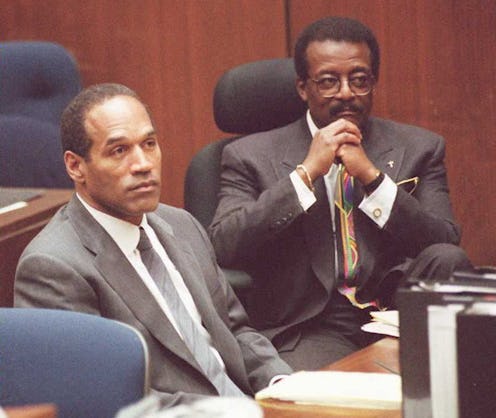Entertainment
Johnnie Cochran's Case History Is Impressive
The eight-month long O.J. Simpson trial has frequently been described as "the trial of the century," and for good reason. Despite being way too young to closely follow or even understand the case, I still vividly remember hearing about it everywhere I went. Although Simpson was at the center of the case, Johnnie Cochran, who died of a brain tumor in 2005, has basically become synonymous with the famous trial — and both men's names are back in the spotlight since the premiere of Ryan Murphy's new FX series, American Crime Story. A lawyer doesn't simply land an incredibly high-profile case without a strong background — so let's take a look at Johnnie Cochran's case history before the Simpson trial.
According to his law firm's official website, Cochran's first job after law school was in the criminal division of the City Attorney’s Office in Los Angeles. He left that role after several years to found his own firm, but accepted the position of Assistant District Attorney of Los Angeles County in 1978. Just three years later, Cochran returned to private practice. Let's take a look at some of his major cases before the Simpson trial made him a household name:
The Leonard Deadwyler Case (1966)
As reported by The Washington Post, Leonard Deadwyler, an African-American man, was shot dead by Los Angeles police during a traffic stop in 1966. Deadwyler was unarmed and had been speeding in order to get his pregnant wife to the hospital. After the district attorney did not press charges, Deadwyler's family hired Cochran to sue the city of Los Angeles.
Although he didn't win the civil suit, Cochran described it as the case that affected him the most, according to Jet. It dispelled his beliefs that about "the existence of equal justice for all and Lady Justice being blind." Instead of seeing it as a failure, Cochran used the Deadwyler case as an inspiration for his career path — his mission became to do everything in his power to ensure the justice system didn't fail the African-American community.
The Geronimo Pratt Case (1972)
In 1970, Geronimo Pratt, a member of the Black Panther Party, was charged with the murder of a white schoolteacher, Caroline Olsen. Cochran was Pratt's defense attorney in the 1972 trial which The Los Angeles Times described as "a sham, marked by the prosecution's deceitful withholding of exculpatory evidence and the presence of a government spy, still unidentified, inside the defense team." Pratt was convicted and spent 27 years in prison — eight of them in solitary confinement.
Cochran refused to accept the wrongful conviction and worked tirelessly until it was finally overturned in 1997. Pratt told the LA Times that his communication with Cochran during his imprisonment helped him get through the ordeal. After the conviction was overturned, Cochran helped Pratt secure a settlement of over $4 million. He used the compensation to fund youth programs and development projects in Africa.
The Ron Settles Case (1983)
Shortly after returning to private practice, Cochran took on the case of Ron Settles, a college football player who died in his jail cell after a struggle with a police officer. According to The New York Times, county officials alleged that Settles' death was a suicide — but his family vehemently denied this claim:
The Settleses charged in the suit that son had been ''severely beaten, strangled and killed'' while in the custody of the Signal Hill Police Department. They charged that the department promoted a policy of excessive use of force, particularly against blacks, in its training programs.
Cochran settled the case out of court in 1983 and the Settles family received approximately $1 million, though one of the defendants, Jerry Brown, "did not agree with the settlement." The New York Times quoted Cochran as stating that, "[a] substantial measure of justice has been achieved."
The Todd Bridges Case (1990)
Actor Todd Bridges was charged with assault by firearm for the 1989 shooting of a drug dealer and was represented by Cochran during his 1990 trial. The Los Angeles Times reported that eyewitnesses provided conflicting accounts about Bridges' whereabouts at the time of the shooting and jurors ultimately agreed the prosecution's case had "too many holes," finding the actor not guilty. Cochran told the paper that the verdict signaled that "justice is alive and well in Los Angeles."
The Reginald Denny Case (1992)
The acquittal of the Los Angeles police officers who were caught on video beating Rodney King sparked a series of intense riots. Reginald Denny, a white truck driver, was severely beaten during these riots. According to the Los Angeles Times, Cochran declined to represent the men who attacked Denny — and he ended up representing Denny instead.
Cochran filed a civil suit against the LAPD for their failure to "act with sufficient force in quelling April's riots." Although Time reports that the lawsuit was unsuccessful, it illustrates that Cochran worked on a wide range of cases and he wasn't afraid to take risks. And, although he was dedicated to ensuring the African-American population received the fair trials they were entitled to, Cochran was committed to ensuring justice for anyone — regardless of race.
